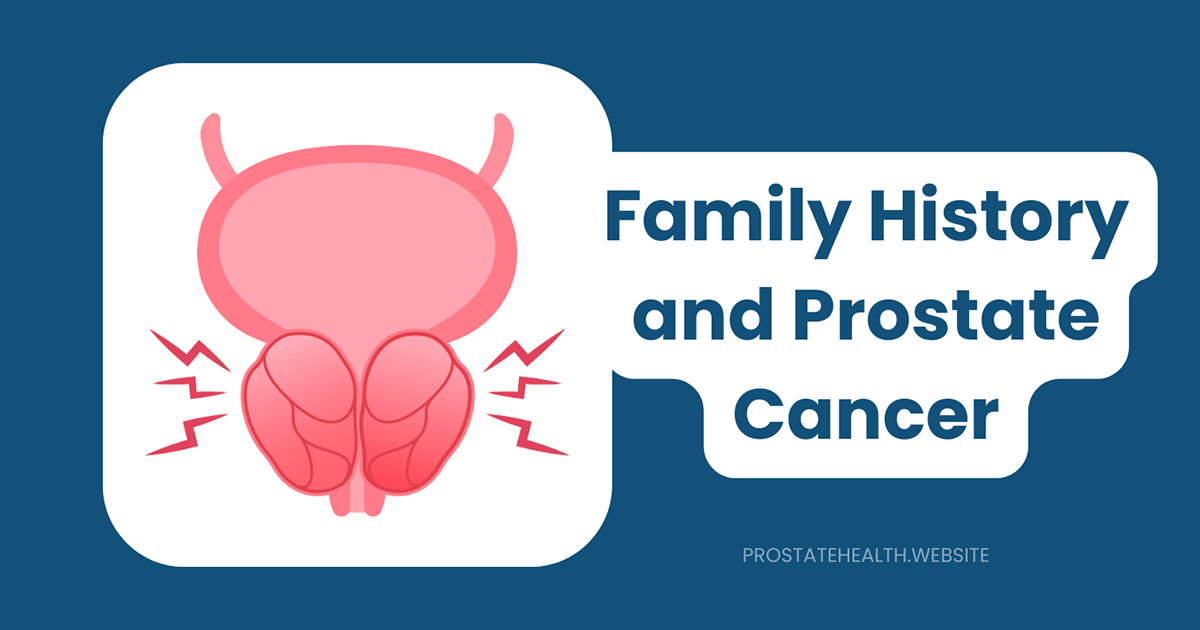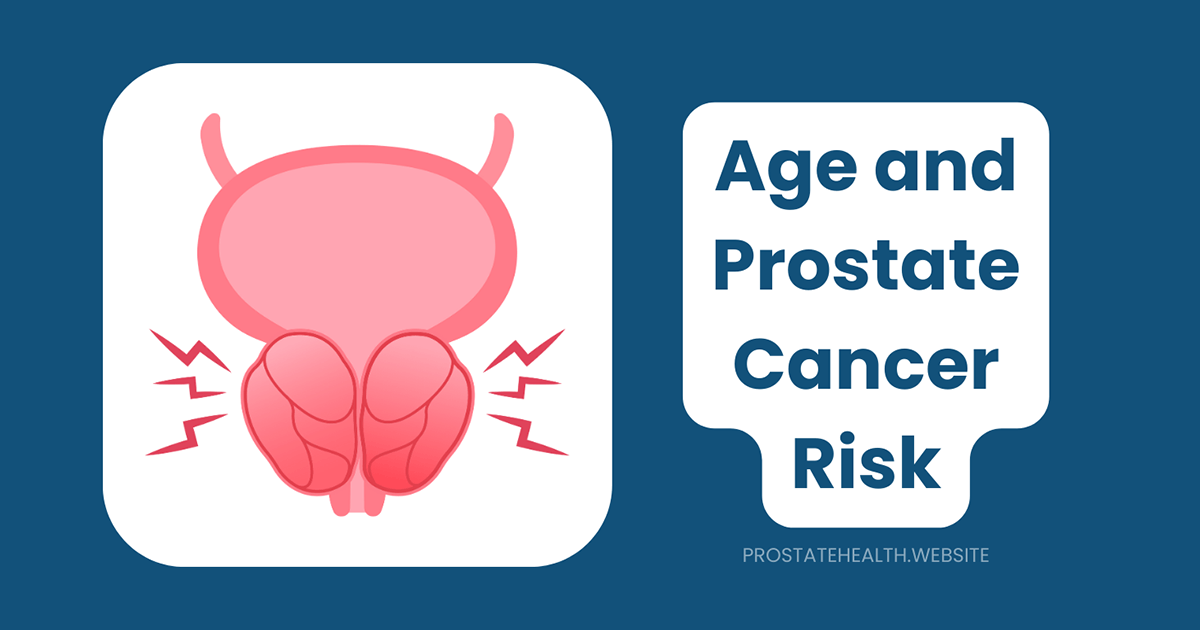Family History of Prostate Cancer: What It Means for Your Risk

“My father had prostate cancer. What does that mean for me?”
This question weighs heavily on the minds of countless men who have watched fathers, brothers, or other male relatives face prostate cancer. The concern is valid—family history is indeed one of the strongest risk factors for developing this disease. But what exactly does having a family history of prostate cancer mean for your personal risk? And more importantly, what can you do about it?
In this comprehensive guide, we’ll explore the complex relationship between family history and prostate cancer risk, drawing on the latest research to help you understand your personal risk profile and take appropriate action.
Understanding the Family Connection: How Strong Is the Link?
The connection between family history and prostate cancer risk is well-established and significant. According to the American Cancer Society, having a first-degree relative (father or brother) with prostate cancer more than doubles a man’s risk of developing the disease.
But the details matter. Let’s break down what research tells us about this connection:
First-Degree Relatives
The strongest familial risk comes from having affected first-degree relatives (father, brother, or son):
- One first-degree relative: Risk increases approximately 2-3 times
- Two or more first-degree relatives: Risk increases about 5-11 times
- First-degree relative diagnosed before age 65: Risk increases even further
Dr. James Wilson, oncologist at University Medical Center, explains: “The younger your relative was when diagnosed, the more likely there’s a hereditary component at play. A father diagnosed at 75 suggests a different level of inherited risk than one diagnosed at 55.”
Second-Degree Relatives
Having second-degree relatives (grandfather, uncle) with prostate cancer also increases risk, though to a lesser extent:
- Risk increases approximately 1.5-2 times with affected second-degree relatives
- The effect is stronger when multiple second-degree relatives are affected
Maternal vs. Paternal History
Interestingly, research suggests that risk may be slightly higher when the family history comes from the maternal side (mother’s father or brothers) compared to the paternal side, though both are significant.
“This pattern suggests that some prostate cancer risk genes may be X-linked or influenced by maternal inheritance patterns,” notes Dr. Sarah Williams, genetic counselor specializing in cancer risk.
Is Prostate Cancer Hereditary? Understanding Genetics vs. Family Patterns
When discussing family history and prostate cancer, it’s important to distinguish between two related but distinct concepts:
Familial Prostate Cancer
This refers to families with more cases of prostate cancer than would be expected by chance, but without a clear pattern of inheritance or identified genetic mutation. Environmental factors shared by family members may contribute to this pattern.
Hereditary Prostate Cancer
This refers to prostate cancer caused by specific inherited genetic mutations passed down through generations. These cases often follow more predictable inheritance patterns and may be associated with earlier onset and more aggressive disease.
Dr. Robert Chen, genetic oncologist, clarifies: “While about 25% of men with prostate cancer report having a family history of the disease, only about 5-10% have true hereditary prostate cancer linked to specific genetic mutations. However, this percentage may be higher than currently detected, as ongoing research continues to identify new genetic markers.”
The Genetics of Prostate Cancer: Key Genes and Mutations
Recent advances in genetic research have identified several specific genes associated with increased prostate cancer risk:
BRCA1 and BRCA2
While best known for their association with breast and ovarian cancer, mutations in these genes also increase prostate cancer risk:
- BRCA1: Increases risk by approximately 1.8-3.8 times
- BRCA2: Increases risk by approximately 2.5-8.6 times, with a higher likelihood of aggressive disease
Men with BRCA2 mutations, in particular, tend to develop more aggressive forms of prostate cancer and at younger ages.
HOXB13
A rare but significant mutation in the HOXB13 gene is associated with early-onset, hereditary prostate cancer:
- Increases risk by approximately 3-5 times
- More common in families with multiple cases of early-onset prostate cancer
- Particularly prevalent in families of Northern European descent
WNT9B
A newly identified gene in 2025 research from Vanderbilt University Medical Center, published in JCO Precision Oncology, found that inherited mutations in the WNT9B gene significantly increase prostate cancer risk:
- Risk estimates range from 2 to 12 times higher
- The risk is comparable to that of breast cancer mutations routinely tested for in breast cancer care
Lynch Syndrome Genes (MLH1, MSH2, MSH6, PMS2)
Lynch syndrome, also known as hereditary non-polyposis colorectal cancer (HNPCC), is associated with increased risk for several cancers, including prostate cancer:
- Men with Lynch syndrome have approximately 2-3 times higher risk of prostate cancer
- These cancers may be more aggressive and develop at younger ages
ATM, CHEK2, PALB2, and Other DNA Repair Genes
Mutations in genes involved in DNA repair pathways have been linked to increased prostate cancer risk:
- Risk increases vary by specific gene, ranging from 1.5 to 5 times higher
- These mutations may also affect how prostate cancer responds to certain treatments
Beyond Single Genes: Polygenic Risk Scores
Not all genetic risk comes from rare, high-impact mutations. Recent research has focused on polygenic risk scores (PRS), which assess the combined effect of many common genetic variants:
- A 2025 study published in Science Direct found that men with a high polygenic risk score (top 20%) had a significantly higher risk of developing lethal prostate cancer
- When combined with family history, the predictive power increases substantially
- 47% of early lethal prostate cancer cases had a high PRS, compared to 36% of non-lethal cases
Dr. Michael Chen, researcher in cancer genetics, explains: “Polygenic risk scores represent the next frontier in prostate cancer risk assessment. By looking at hundreds or thousands of genetic variants simultaneously, we can identify men at elevated risk even without a strong family history or known high-risk mutations.”
Family History Plus Other Risk Factors: The Cumulative Effect
Family history doesn’t exist in isolation. Its impact on prostate cancer risk is influenced by and interacts with other risk factors:
Age
Age remains the strongest risk factor for prostate cancer, with risk increasing significantly after age 50. However, men with a family history tend to develop prostate cancer 5-10 years earlier than those without.
Race/Ethnicity
African American men have the highest prostate cancer rates in the world—about 60% higher than white men. When combined with family history, the risk is compounded:
- African American men with a family history have a substantially higher risk than white men with a similar family history
- The disease tends to develop at younger ages and may be more aggressive
Lifestyle Factors
Emerging research suggests that lifestyle factors may modify genetic risk:
- A 2025 study found that healthy lifestyle choices could partially offset genetic risk
- Men with genetic risk factors but healthy lifestyles had lower odds of developing early lethal prostate cancer compared to those with unhealthy lifestyles
Assessing Your Personal Risk: What to Consider
If you have a family history of prostate cancer, here are key factors to consider when assessing your personal risk:
Number of Affected Relatives
The more relatives affected, the higher your risk. Keep track of all known cases in your family.
Age at Diagnosis
Earlier diagnoses (before age 65) in your family suggest stronger genetic components and higher risk for relatives.
Pattern of Inheritance
Look for patterns that might suggest hereditary cancer syndromes, such as:
- Multiple affected men across generations
- Cancer diagnoses at younger ages
- Multiple types of cancers in the same family (especially breast, ovarian, pancreatic, or colorectal cancers)
Other Known Risk Factors
Consider how your family history interacts with other risk factors you may have, such as:
- Age (risk increases significantly after 50)
- Race/ethnicity (highest in African American men)
- Known genetic mutations in your family
Screening Recommendations: When to Start and How Often
Having a family history of prostate cancer affects recommendations for when to begin screening:
Average Risk Men (No Family History)
- Begin discussions about prostate cancer screening at age 50
- African American men should begin discussions at age 45
Men with Family History
- One first-degree relative: Begin discussions about screening at age 45
- Multiple first-degree relatives or relatives diagnosed before age 65: Begin discussions about screening at age 40
- Known genetic mutations in the family: Begin discussions about screening at age 40, or possibly earlier depending on the specific mutation
Dr. Wilson emphasizes: “These are general guidelines. The decision to screen should always be individualized based on your complete risk profile and personal preferences. A conversation with your healthcare provider is essential.”
Screening Methods
Standard screening methods include:
- PSA (Prostate-Specific Antigen) blood test: Measures a protein produced by the prostate that may be elevated in cancer
- Digital Rectal Examination (DRE): Physical examination to check for prostate abnormalities
For men with strong family history or known genetic mutations, additional screening approaches may be considered:
- More frequent PSA testing (annually rather than every 2-4 years)
- Baseline PSA testing at a younger age to establish personal PSA patterns
- Advanced imaging such as prostate MRI in certain high-risk cases
Genetic Testing: Is It Right for You?
Genetic testing can provide valuable information about your prostate cancer risk, especially if you have a strong family history. Consider testing if:
- You have multiple relatives with prostate cancer, especially if diagnosed at younger ages
- Your family has a pattern of multiple cancer types, particularly breast, ovarian, pancreatic, or colorectal cancers
- You’ve been diagnosed with prostate cancer at a young age (under 65)
- You have aggressive or metastatic prostate cancer
Dr. Williams advises: “Genetic testing isn’t just about determining risk. For men already diagnosed with prostate cancer, genetic information can guide treatment decisions, including eligibility for targeted therapies like PARP inhibitors.”
The Genetic Testing Process
If you decide to pursue genetic testing:
- Genetic counseling: Meet with a genetic counselor before testing to understand what the results might mean for you and your family
- Sample collection: Typically a blood or saliva sample
- Analysis: Testing for known cancer-related gene mutations
- Results and follow-up counseling: Discuss results and their implications for your health management
Risk Reduction Strategies: Taking Control
While you can’t change your genetics or family history, there are steps you can take to potentially reduce your risk or detect prostate cancer early when it’s most treatable:
Screening and Early Detection
- Follow screening recommendations based on your risk profile
- Maintain regular check-ups with your healthcare provider
- Be aware of potential symptoms (though early prostate cancer often has no symptoms)
Lifestyle Modifications
Research suggests several lifestyle factors may help reduce prostate cancer risk:
- Diet: Emphasize a diet rich in fruits, vegetables, and whole grains. Limit red meat and processed foods.
- Exercise: Maintain regular physical activity, aiming for at least 150 minutes of moderate exercise weekly.
- Weight management: Maintain a healthy weight, as obesity is associated with more aggressive prostate cancer.
- Limit alcohol: Excessive alcohol consumption may increase cancer risk.
Dr. Chen notes: “While these lifestyle changes can’t eliminate genetic risk, emerging research suggests they may help modify risk. A 2025 study found that men with genetic risk factors who maintained healthy lifestyles had significantly lower odds of developing early lethal prostate cancer.”
Chemoprevention: Medical Approaches to Risk Reduction
For men at very high risk, medications that may reduce prostate cancer risk might be considered:
- 5-alpha reductase inhibitors: Medications like finasteride and dutasteride have been shown to reduce overall prostate cancer risk, though their use specifically for prevention remains controversial.
- Aspirin and NSAIDs: Some studies suggest regular use may be associated with reduced risk, but evidence isn’t strong enough for general recommendations.
These approaches should only be considered in consultation with a healthcare provider who can weigh potential benefits against risks.
Talking to Your Family: Sharing Genetic Information
If you have a family history of prostate cancer or discover you carry genetic mutations that increase risk, sharing this information with male relatives is important:
- Brothers, sons, nephews, and other male relatives may benefit from knowing their potential increased risk
- This knowledge allows them to pursue appropriate screening and risk reduction strategies
- Consider family dynamics and choose an appropriate time and setting for these conversations
“These conversations can be challenging,” acknowledges Dr. Williams, “but they can also be life-saving. Approach the topic with sensitivity, focusing on how this information empowers family members to be proactive about their health.”
The Psychological Impact: Managing Anxiety About Inherited Risk
Learning about an inherited cancer risk can trigger anxiety and fear. If you’re struggling with these emotions:
- Seek support from healthcare providers, genetic counselors, or mental health professionals
- Connect with support groups for people with inherited cancer risk
- Focus on the aspects of your health you can control
- Remember that knowledge is power—understanding your risk allows for proactive management
The Future of Genetic Risk Assessment
Research into the genetic basis of prostate cancer continues to advance rapidly:
- More comprehensive genetic panels: Testing for a wider range of genetic variants
- Improved polygenic risk scores: Better prediction of who will develop aggressive disease
- Integration of genetic and lifestyle data: More personalized risk assessment
- Targeted screening protocols: Tailored to individual risk profiles
- Precision prevention strategies: Interventions based on specific genetic risks
The Bottom Line: Knowledge Is Power
Having a family history of prostate cancer does increase your risk, but it doesn’t mean you’ll definitely develop the disease. Understanding your risk allows you to take proactive steps that may help prevent cancer or detect it early when treatment is most effective.
Dr. Wilson emphasizes: “Men with a family history of prostate cancer shouldn’t feel helpless or fatalistic. Instead, they should feel empowered to take control of their health through appropriate screening, lifestyle modifications, and open communication with healthcare providers.”
By understanding your family history, considering genetic testing when appropriate, following recommended screening guidelines, and adopting healthy lifestyle habits, you can take meaningful steps to manage your prostate cancer risk—turning family history from a source of anxiety into a catalyst for proactive health management.






